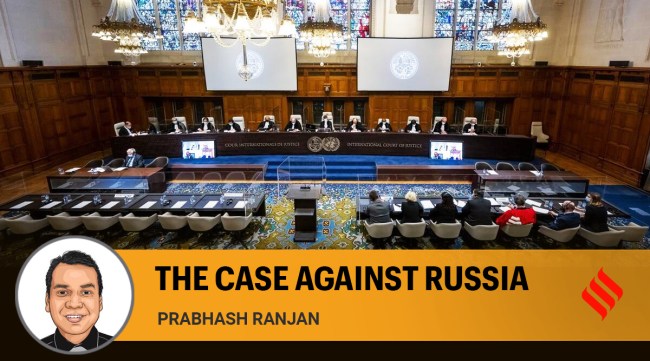Opinion ICJ has ordered an end to invasion of Ukraine. This matters
Prabhash Ranjan writes: The weight of global opinion against Russia on its egregious abuse of international law is mounting with each passing day. Russia can keep ignoring this only at grave peril to itself.
 A view of the International Court of Justice courtroom on March 16, 2022 (Twitter/ CIJ_ICJ)
A view of the International Court of Justice courtroom on March 16, 2022 (Twitter/ CIJ_ICJ) The International Court of Justice (ICJ) — the principal judicial organ of the United Nations (UN) — has ordered Russia to immediately suspend its military operations in Ukraine. In short, to end the war instantly. This decision of far-reaching significance was rendered by the ICJ in response to Ukraine’s application for indication of provisional measures under Article 41 of the ICJ Statute. Provisional measures under the ICJ Statute are the international equivalent of an interim injunction that can be provided by the court to preserve the rights of the parties pending a final decision on the merits of the case.
Ukraine moved the ICJ against Russia accusing it of falsely claiming that Ukrainians are committing genocide in their territory and using this untruthful premise to start an illegal war. This, Ukraine believes, breaches its rights under the Genocide Convention — a treaty that is binding to both Russia and Ukraine.
ICJ’s reasoning is in three parts. First, the court held that it had prima facie jurisdiction in the case because the subject matter fell under the Genocide Convention. Russia tried to wriggle out of this dispute. It contended that its formal basis for use of force against Ukraine was its right to self-defence under Article 51 of the UN Charter (a patently illegal argument, but this issue is not before the ICJ). The court rejected Russia’s argument and held that the existence of a dispute is a matter of substance, and not a question of form or procedure. Since 2014, Russia has been repeatedly accusing Ukraine of committing genocide in the Donetsk and Luhansk regions. Just before the military invasion, Russian President Vladimir Putin mentioned ending the genocide in Ukraine as the reason to use force. Ukraine vehemently rejects this charge. Prima facie, this shows the existence of a “dispute” under Article IX of the Genocide Convention — the compromissory clause that bestows jurisdiction on the ICJ.
Second, after establishing prima facie jurisdiction, the ICJ held that the objective of indicating provisional measures is the preservation of the rights claimed by the parties, pending the decision on merits. Ukraine argues that it has a right under the Genocide Convention not to be falsely accused of genocide and rely on this wrong pretext to use force against its territorial integrity. Since the current proceedings were only for provisional measures, the ICJ did not decide definitively whether Ukraine has such a right under the Genocide Convention. Nonetheless, the ICJ found Ukraine’s right plausible, which is adequate for the current purposes. Further, the court found that a sufficient connection exists between Ukraine’s plausible right and the provisional measures (immediate suspension of military operations) it has sought.
While the court did not decide on whether Russia has breached the Genocide Convention, as this is a question of merits, it did express doubt over whether a country can unilaterally use force against another country for punishing or preventing an alleged act of genocide. This indicates that Russia’s use of force is difficult to justify under the Genocide Convention.
Third, the ICJ held that if it does not indicate provisional measures, that is, order cessation of military action, there is a real and imminent risk of irreparable harm to Ukraine’s rights. This is because of the magnitude of destruction that the ongoing war has caused.
ICJ’s decision is binding on Russia and constitutes part of its international legal obligations. If Russia continues its military actions, it will be a brazen violation of international law. Cynics argue that none of this matters because the remedy for not complying with ICJ rulings lies with the UN Security Council, which has Russia as a permanent member. But just because authoritarian populist leaders like Vladimir Putin don’t care for international law does not diminish its significance. International law, even if not sufficient, is necessary to maintain global order. The ICJ decision is an impactful step in that direction. The weight of global opinion against Russia on its egregious abuse of international law is mounting with each passing day. Russia can keep ignoring this only at grave peril to itself.
This column first appeared in the print edition on March 23, 2022 under the title ‘The case against Russia’. The writer is Professor and Vice Dean, Jindal Global Law School, O P Jindal Global University. Views are personal.






